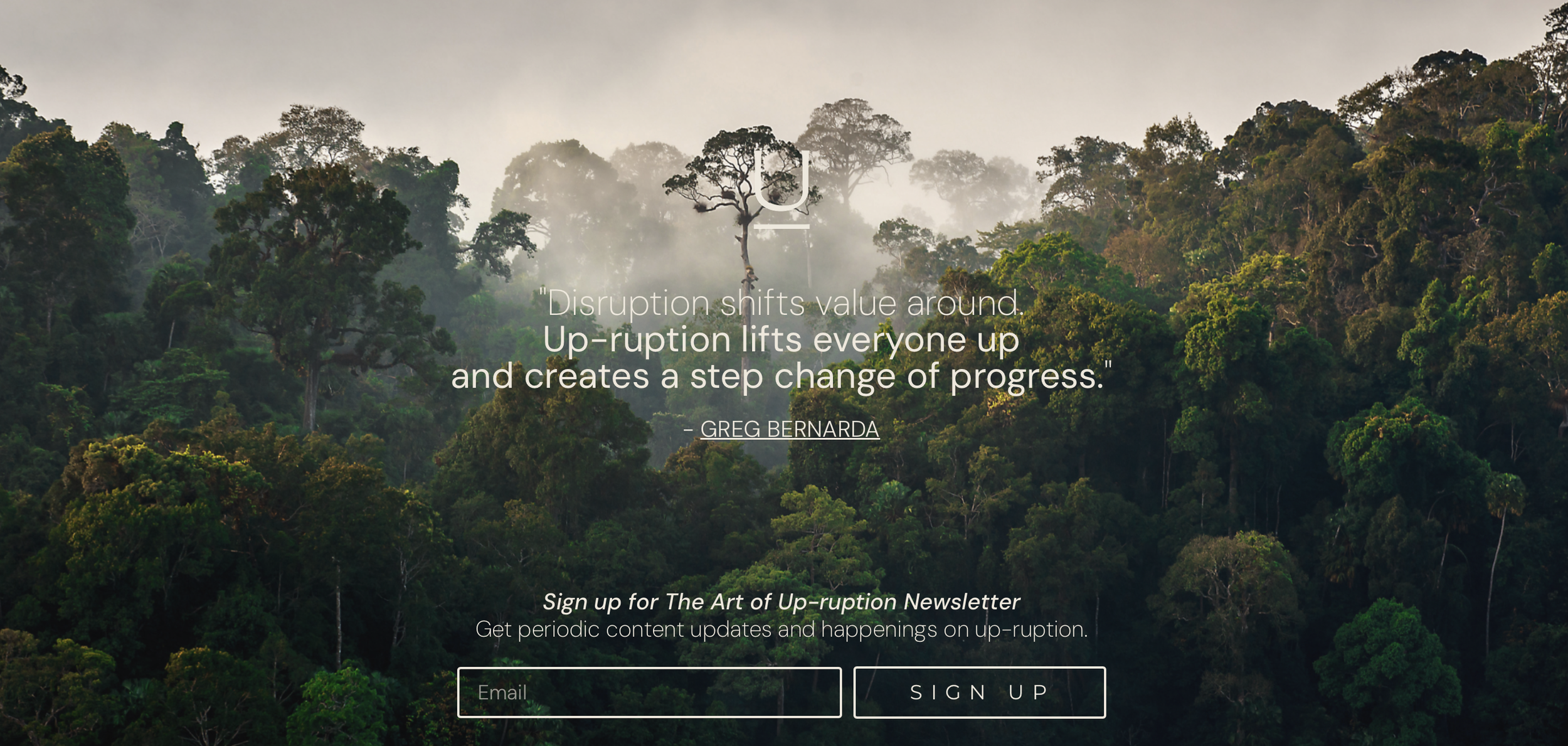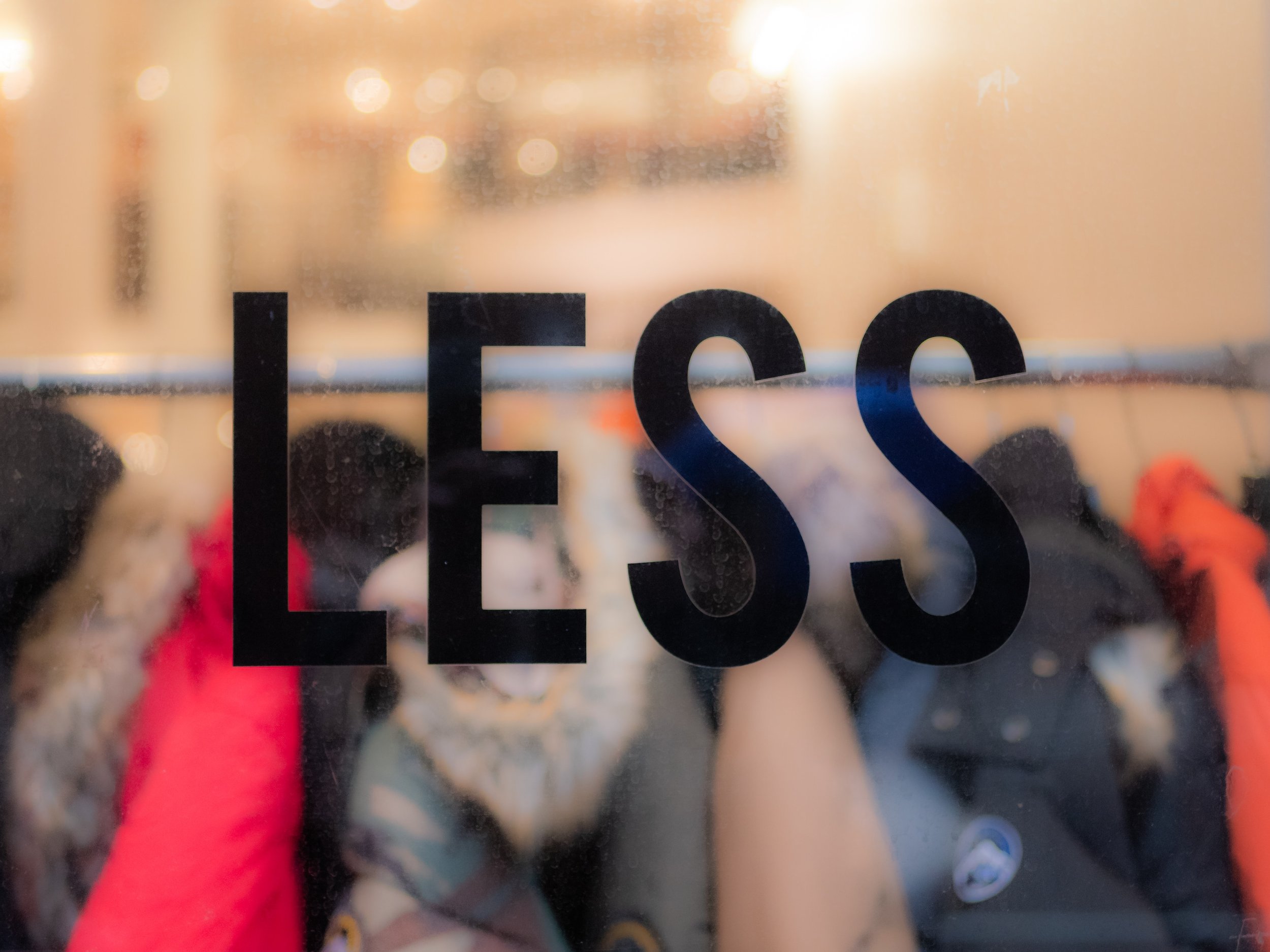Up-ruption, an interview with Greg Bernarda
Greg Bernarda is the initiator of 'up-ruption', an idea nominated for the 2023 Thinkers50 Strategy Award, an alumni of the World Economic Forum, and co-author of the bestseller Value Proposition Design. He’s also a big inspiration for us all at Vibrance and we’re grateful to call him a friend.
In late October 2024, the up-ruption movement will reach the Australian shores once more, as Greg joins us in Melbourne for a series of talks and executive workshops.
I took the opportunity to interview him ahead of his arrival to shed some light on up-ruption.
Fred: We often hear that leaders should embrace disruption for their organisation to stay relevant. What does that mean to embrace disruption? And is it sound advice?
Greg: It’s sound advice in that we all need to remain in touch with the pulse of the times. And part of that requires reinventing ourselves, today more frequently, maybe even constantly.
There’s a catch though, this advice is often taken in the context of seeing the survival of the organisation as the predominant logic.
And I think that is too narrow a view for the world we live in.
And disruption also has a dark side, often leading to job losses, social inequalities, or ethical dilemmas. How do you reconcile the excitement of disruption with the human cost that often accompanies it?
That’s precisely the point indeed. Disruption is a positive force in the context of the organisation. In particular in business and even more so in startups.
But in the context of our personal lives, disruption is bad news. Nobody wants to see themselves disrupted.
There’s this anecdote I once heard from Jaron Lanier, the virtual reality pioneer and tech philosopher on a podcast. It goes something like this: “The higher up somebody is in a tech company in Silicon Valley the more restrictive they are about their kids’ access to internet technology.”
We get up in the morning, brush our teeth, go to work and mobilise all our energy and intelligence at creating something. And the first thing we do when we come home at night is tell our kids ‘don’t touch this thing!.’
We behave as if we have different values in the workplace and in our private lives. This feels like a schizophrenic way of living, both individually and at a collective level.
Now I can’t hold that question any longer. What is up-ruption? Is it an aspiration, a clever play on words or an observable, emerging reality in the ever-changing business environment?
It’s all of the above 🙂 and more:
It’s an aspiration because so many of us indeed don’t want to lead schizophrenic lives. It’s more and more untenable for people to operate out of a limited logic that doesn’t include our own personal and collective well-being.
It’s a clever play on word of course. Etymologically, disruption means to break apart. That is a useful energy, as often things are stuck in outdated schemes that no longer work. But that is one side of the coin. With the breaking apart, new energy is released, something new becomes possible. Connecting with this possibility, following it, supporting it is the other side. Up-ruption is the combination of these two movements, whose aim is to result as an upward breakthrough. It releases new potential and opens a new and better way of doing something.
And it’s an observable reality as well. When organisations or collectives take a deeper view of the people they serve and a broader view of their context, they tap into new potential and the possibility to create a new and better version of the theme they are working on. One that lifts people and the entire system to a new way of functioning that enables yet more and better value to be created. This is an approach present in some of the most significant socio-economic transformations of our time from the development of electricity in 19th century Europe, to the rise of micro-finance in South Asia in the 1980s, the App economy in the US, or e-commerce in China - to name a few.
But above all, up-ruption is a capability.
A capability always has two sides: an internal side, which is the ability to be, see and act differently. And an external side - the ability to practically impact the world in new and better ways.
In that sense, we can observe various degrees of advancements of up-ruption, and there’s always more to do. My own fascination is to observe this phenomenon as a globally unfolding story which takes different expressions depending on each context, while sharing a set of common principles. I see this in the projects I am in contact with, from the upliftment of the construction sector in France, to a brand new impact ecosystem at scale in the Netherlands, and the brewing of new development models in Saudi Arabia.
Do you believe large, established companies can “up-rupt” themselves? Could you share an example of a legacy company that has successfully embraced up-ruption?
If they can disrupt themselves, they can surely up-rupt themselves as well!
Intel in the 1990s is an interesting story of a company who went from being mere microprocessor manufacturer to the architect of the PC industry, unlocking both the imagination and concrete applications for what a computer meant and could do. This created tremendous value for end-users (virtually all of us) and the industrial actors involved.
Intercorp in Peru is attempting something similar at the moment, shifting from their role of banker to embracing a grander societal purpose of lifting the country’s middle class.
One of the organisations I work with is a 200-year old construction company in Japan who is taking the much broader view of ecosystem development as the starting point of future value creation. What’s striking is that construction is not the conversation starter here, nor is it even the context. They get that it’s all about understanding the bigger picture of what communities will need to thrive in the future.
Are there contexts where up-ruption doesn’t apply?
I don’t think so.
I think it is fundamentally a choice.
Up-ruption is a possibility to evolve to the next level.
Far from only being relevant to a business context, it applies to any arena of human endeavour at any scale: individuals, organisations, cities, nations, civilisations.
The only requirement is to be open to it. If we are, all contexts apply.
What are the characteristics of leaders that embrace up-ruption?
Good question.
I think about leadership as the capacity to feel the needs of our time and to channel them to a higher expression, in whatever the domain is - healthcare, education, mobility, etc.
Some don’t feel the need of our time.
Some feel it but exploit it by adding fuel to the fire of dissatisfaction.
And some feel it and then build something to provide higher and deeper fulfilment.
To do this requires similar skills as to make a relationship, a family, or a sports team work.
It requires the ability to recognise the ‘us’, the ‘collective’ in the situation and the ability to care for it, in addition to caring for our own self or organisation.
You’ve spent a lot of time thinking about ecosystems and advising organisations on this topic in the last few years. How are ecosystems and up-ruption connected?
In two ways:
First, everything is a system that lives inside bigger systems. Parts forming a whole, connected to other wholes. Any meaningful change needs to take that into account, otherwise it will always feel like part of the picture is missing. Back to etymology, ‘eco’ means home, and so I like to think of an ecosystem as a system of parts that feel at home with each other. If parts are well connected, it makes a whole. In other words, it has the quality of wholeness. This is what we aim for with up-ruption.
Second, the word ecosystem has come to specifically mean the system wider than the organisation. That is the terrain in which some of the most innovative actors are operating already, from Tesla’s focus on not just building cars but enabling the transition to an electric economy and delivering at that scale with charging networks, new power generation utilities, or giga factories. I believe that this happens to be an appropriate scale for the times we live in. It is what is required to tackle the systemic nature of our issues, while still being practical and corresponding to the means at our disposal.
If the traditional CEO thinks about their own house, the ecosystem leader thinks about the entire village. They take a larger responsibility and access a larger terrain of value creation. That way, they can unlock bigger change and better value.
McKinsey promises access to huge growth pools to those who engage in ecosystems. How does up-ruption think about growth and its potential negative consequences?
(“By 2030, ecosystems will play a major role in almost every aspect of global economy, driving around $80 trillion in annual revenue — a third of total global revenue.“ McKinsey)
From an organisational standpoint I do think it’s an enormous opportunity.
Large tech companies in the West (Amazon, Facebook, Google, etc) or the East (e.g. Alibaba, Tencent) are giving us a preview of the ability of ecosystems to generate and capture value.
But there’s also the notion that is pretty obvious nowadays that unbridled growth doesn’t bring the best to us at a collective level.
Going from a business to an ecosystem approach can mean going from a bull to a herd of bulls in the China shop. If we keep the same thinking, what we get is more of the same.
This is a logic of efficiency. It can be good, but being efficient at something we don’t really want, that’s a problem.
The difference with up-ruption is the opportunity to upgrade what we do and lift the ecosystem to a place where higher value is unlocked and empowers people and stakeholders in new and more wholesome ways. That’s what we see in the best cases out there, such as with Taobao and Chinese e-commerce or Intel and the PC Industry.
It’s a story of unlocking new potential and empowerment.
You have spent a large part of your career in the world of innovation, how are up-ruption and innovation connected
Up-ruption is a way of unlocking the authentic potential of innovation.
The idea is to up-rupt innovation if you like!
One way I like to think is that innovation needs to go from teenagehood to adulthood.
Innovation is a relatively young discipline. It started to get traction in boardrooms in the mid-2000s. So, it’s basically just getting into its twenties. Just like it’s natural for a teenager to get excited by endless possibilities, innovation has been thrown at any and every application, some worthwhile, some more gadget-like.
Now that it is reaching maturity, along comes the time to gather all it’s learned and acquired and ground itself in purpose and service.
One of the most disruptive forces the world is facing now is AI. How does AI impact up-ruption? Can AI accelerate up-ruption?
AI is vast and I won’t pretend to reduce it to a few simple remarks. That said, my sense is that AI is an accelerator. And the question becomes: ‘what is it that we want to accelerate’?
There’s this popular quote from Edward Wilson, an American sociobiologist:
‘The real problem of humanity is that we have Paleolithic emotions, medieval institutions and god-like technologies.’
We have big tools in our hands, what are we going to use them for?
I think the trap is to concentrate on the possibilities of technology or AI outside of their human and societal contexts.
Like any powerful technology, it needs to be guided by vision.
This is a common principle in up-ruption stories. Whether it is the availability of e-commerce technology in China, the making of new computing standards by Intel for the industry, or new construction methods in the French industry, the focus is never about the tool itself, it is always about what new value creation and societal possibility it can enable.
If we don’t think about that, sure there will be a gazillion new fantastic things coming our way, but how many of those will be in true service to our truest aspirations as opposed to an accelerated projection of the way we currently think and conceive of value and progress?
For leaders in large, established companies, is up-ruption a bold strategic move or a risky gamble?
It is at once the boldest and the most obvious of moves.
Bold because as with any honest pursuit in life, challenges inevitably arise on the way. But obvious, because once we connect with our most authentic purpose and perceive its possibilities, it becomes natural to do it anyway.
The prize is large: to reconnect (our) business - the most powerful change agent and value creation engine of history - with the upliftment of society.
This is also what unleashes new energy for oneself as a leader, and for all who need to be engaged in the process, in particular the next generation who is already investing their creative resources in places resonant with their values.
For leaders listening/watching this who are looking to be up-ruptors in their own industries, what final advice would you give them?
To try it out for size and ask: what would an up-ruption look like in my domain?
Note: an earlier version of this post was originally published on the Vibrance blog










